Unit 3 Could you please tell me where the restrooms are? 复习课件(共26页PPT)
文档属性
| 名称 | Unit 3 Could you please tell me where the restrooms are? 复习课件(共26页PPT) |  | |
| 格式 | pptx | ||
| 文件大小 | 433.2KB | ||
| 资源类型 | 教案 | ||
| 版本资源 | 人教新目标(Go for it)版 | ||
| 科目 | 英语 | ||
| 更新时间 | 2024-08-03 15:43:44 | ||
图片预览

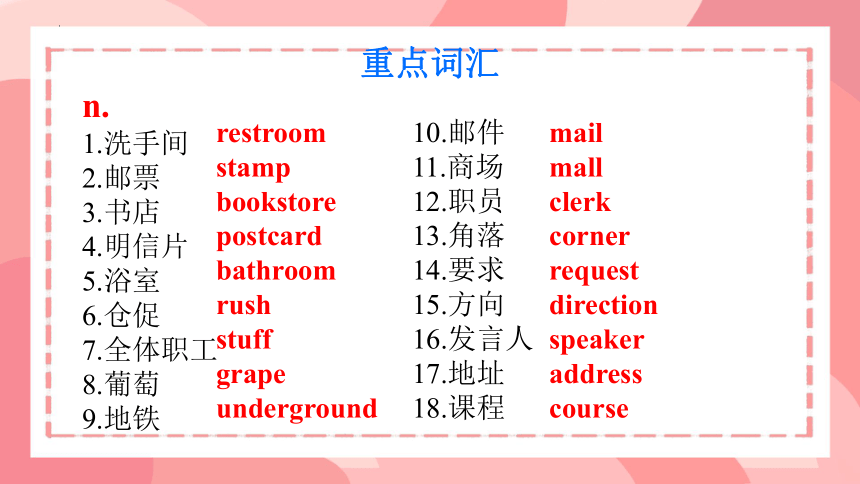
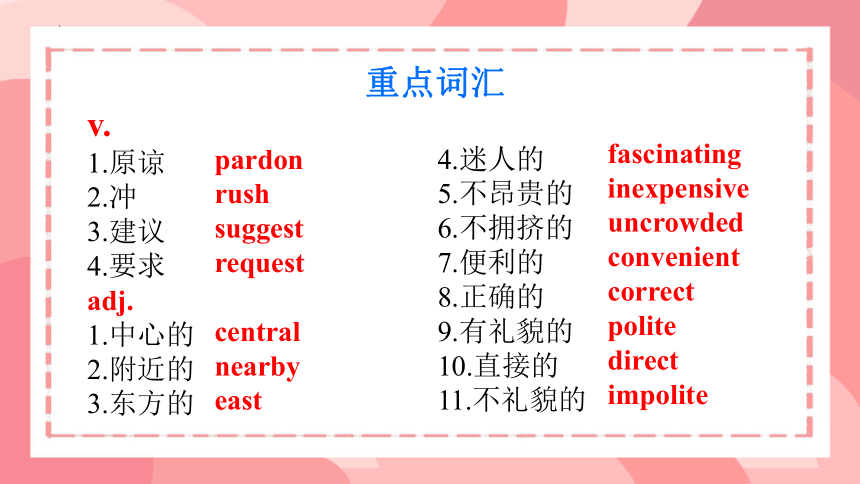

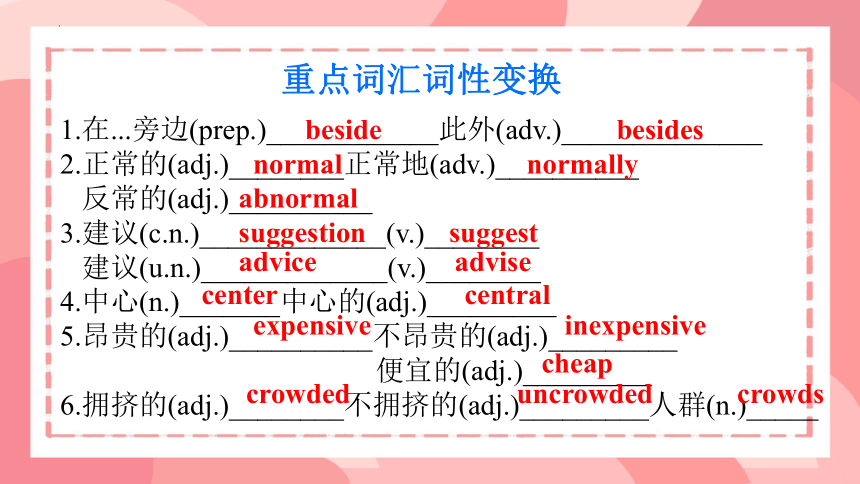
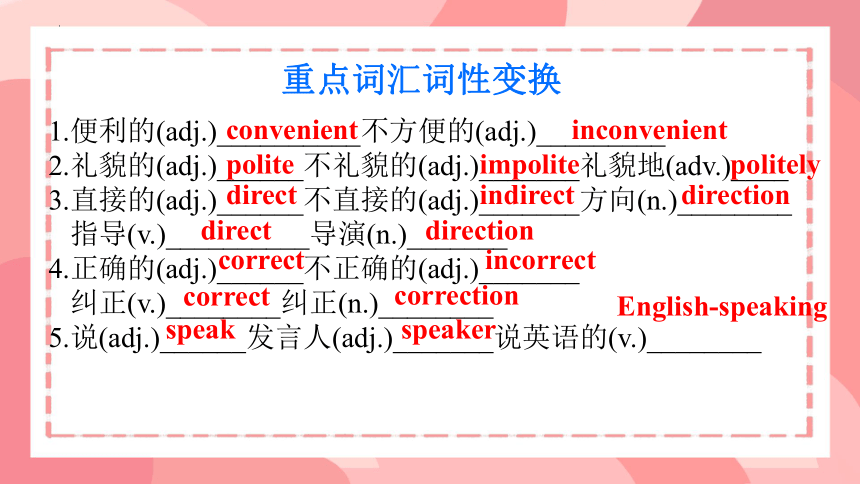
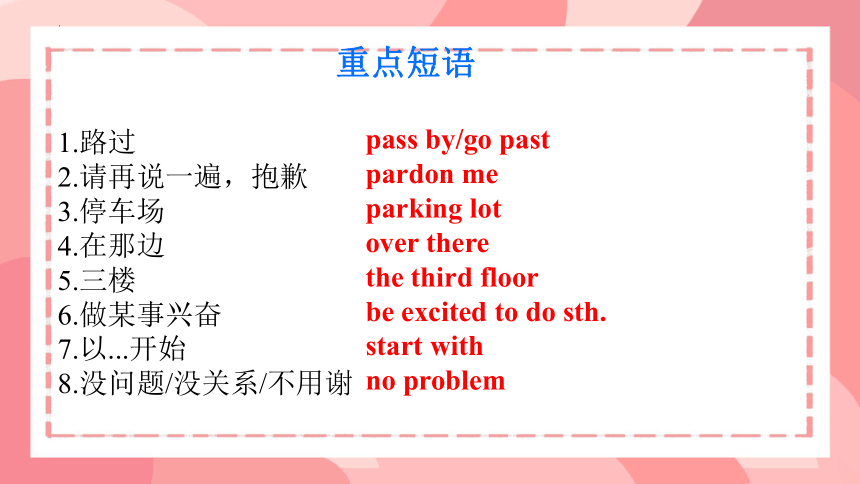
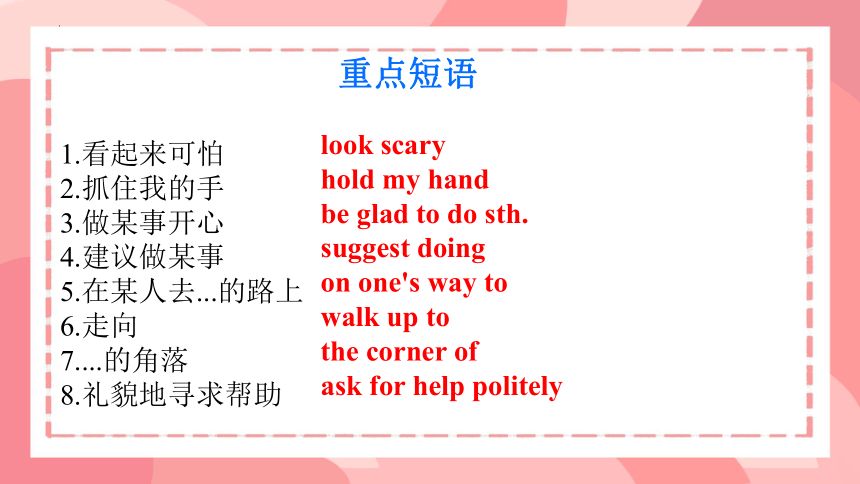
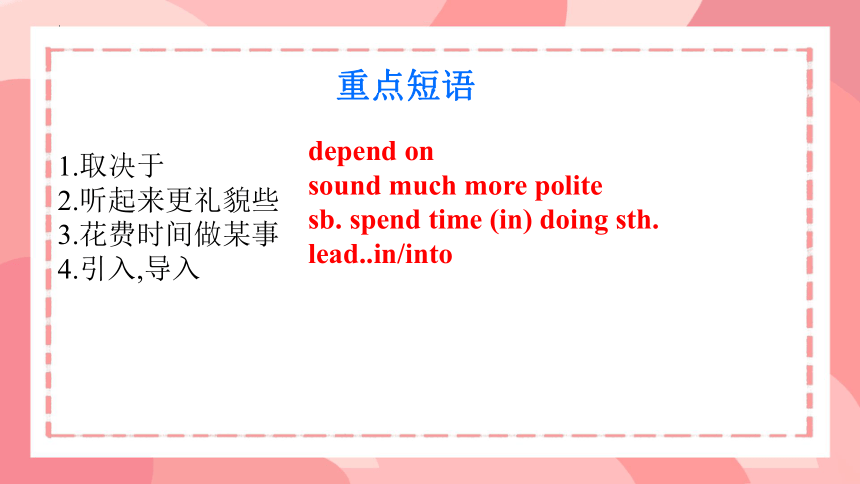
文档简介
(共26张PPT)
人教版Go For it
九年级U3单元知识点整合
重点词汇
n.
1.洗手间
2.邮票
3.书店
4.明信片
5.浴室
6.仓促
7.全体职工
8.葡萄
9.地铁
10.邮件
11.商场
12.职员
13.角落
14.要求
15.方向
16.发言人
17.地址
18.课程
restroom
stamp
bookstore
postcard
bathroom
rush
stuff
grape
underground
mail
mall
clerk
corner
request
direction
speaker
address
course
重点词汇
v.
1.原谅
2.冲
3.建议
4.要求
adj.
1.中心的
2.附近的
3.东方的
4.迷人的
5.不昂贵的
6.不拥挤的
7.便利的
8.正确的
9.有礼貌的
10.直接的
11.不礼貌的
pardon
rush
suggest
request
central
nearby
east
fascinating
inexpensive
uncrowded
convenient
correct
polite
direct
impolite
重点词汇
prep.
1.在...旁边
pron.
1.谁
adv.
1.通常地
2.在附近
3.礼貌地
beside
whom
normally
nearby
politely
重点词汇词性变换
1.在...旁边(prep.)____________此外(adv.)______________
2.正常的(adj.)________正常地(adv.)__________
反常的(adj.)__________
3.建议(c.n.)_____________(v.)________
建议(u.n.)_____________(v.)________
4.中心(n.)_______中心的(adj.)_________
5.昂贵的(adj.)__________不昂贵的(adj.)_________
便宜的(adj.)_________
6.拥挤的(adj.)________不拥挤的(adj.)_________人群(n.)_____
beside
normal
abnormal
suggestion
crowded
besides
normally
center
central
suggest
advice
advise
expensive
inexpensive
cheap
uncrowded
crowds
重点词汇词性变换
1.便利的(adj.)__________不方便的(adj.)_________
2.礼貌的(adj.)______不礼貌的(adj.)_______礼貌地(adv.)____
3.直接的(adj.)______不直接的(adj.)_______方向(n.)________
指导(v.)__________导演(n.)_______
4.正确的(adj.)______不正确的(adj.)_______
纠正(v.)________纠正(n.)________
5.说(adj.)______发言人(adj.)_______说英语的(v.)________
convenient
inconvenient
polite
impolite
politely
direct
indirect
direction
direct
direction
correct
incorrect
correct
correction
speak
speaker
English-speaking
重点短语
1.路过
2.请再说一遍,抱歉
3.停车场
4.在那边
5.三楼
6.做某事兴奋
7.以...开始
8.没问题/没关系/不用谢
pass by/go past
pardon me
parking lot
over there
the third floor
be excited to do sth.
start with
no problem
重点短语
1.看起来可怕
2.抓住我的手
3.做某事开心
4.建议做某事
5.在某人去...的路上
6.走向
7....的角落
8.礼貌地寻求帮助
look scary
hold my hand
be glad to do sth.
suggest doing
on one's way to
walk up to
the corner of
ask for help politely
重点短语
1.取决于
2.听起来更礼貌些
3.花费时间做某事
4.引入,导入
depend on
sound much more polite
sb. spend time (in) doing sth.
lead..in/into
1.shout
尖叫
shout at VS shout to
shout at 侧重不礼貌地对某人大喊大叫
shout to 侧重向远处喊叫
He __________me so that I could hear his voice.
It is impolite to_________our parents.
shouted to
shout at
Language point
2.I was scared at first,but shouting did help
(1)at first 表示首先
(2)动词放句首做主语要变成动名词ing的形式。
________(穿)dress is fascinating.
拓展知识:这里的did放在动词help前面,意为“确实,的确”。当我们需要对谓语动词进行强调时,通常在谓语动词前加助动词do,does或did(这里根据时态和人称来确定),真正的谓语动词用原形。
Wearing
我一开始很害怕,但是尖叫确实有用。
3.I suggest Water City Restaurant in Water World.我建议去水世界的水城餐馆。
suggest及物动词,意为“建议,提议”,其主要用法为:
①suggest sth. (to sb.)向某人提议/建议某事
e.g.He suggested a walk outside to us.
②suggest doing sth.建议做某事
e.g.She suggested going for a walk outside.
n.suggestion 可数名词
类比 advice 不可数
=advise doing sth
③suggest+that引导宾语从句,意为“建议……”,这时宾语从句要用虚拟语气,谓语动词用“(should/...)+动词原形”
e.g.He suggested (that) we could go out for a walk.
拓展
①suggest的名词形式为suggestion,意为“建议,提议”
e.g.May I give you a suggestion
②在表示“建议某人做某事”时,可用advise sb. to do sth.,不能用suggest sb. to do sth.
4. On their way to Water City Restaurant, Alice and He Wei pass by Uncle Bob’s.
在他们去水城餐馆的路上,爱丽丝和何伟路过鲍勃叔叔的餐馆。
(l) on one’s way to ... 意为“在某人去的路上”。
I met a very good policeman on my way to school today.
今天在去上学的路上,我遇到了一位非常好的警察。
由way构成的其他短语:
by the way 顺便问/提一下
in a way 在某种程度上
in the way 妨碍;挡道
in this way 这样;通过这种方法
lose one’s way 迷路
get out of the way of sth. 丢掉......的习惯
5.a little earlier
再早一点
Topic:比较级的修饰
a little,a bit 削弱比较级
much,even 加强比较级
强壮很多
漂亮很多
高一点
much stronger
much more beautiful
a little taller
一、宾语从句的概念
在句子中起宾语作用的从句叫做宾语从句。
We know(that) Mr Green teaches English.
She asked if /whether these answers were right.
二、宾语从句三要素
重点语法—宾语从句
特殊疑问词(如who, what, why, where, whose等wh-连接词),后面变为陈述语序(3种词放主语后)。
eg.I wonder if he is a driver. 我想知道他是否是个司机。
Do you know where I can get a dictionary
你知道我在哪里能买到词典吗?
由...转化成的
连接词
陈述句
that(可省)
一般疑问句
if或whether(or not)
特殊疑问句
特殊疑问词
引导词
e.g. I don't know if/whether I should take his advice.
I wonder if/whether you have finished your homework.
一般疑问句作宾语时,宾语从句用____或__________引导。它们在句子中的意思是______(如果 / 是否), 在从句中不充当任何成分,但不可省略。
if
whether
是否
Should I take his advice
Have you finished your homework
辨析
不管什么类型的宾语从句,总是用陈述句语序,即从句的连接词后是主语+谓语+宾语的语序。当连接词作主语时,后面直接跟谓语和宾语。
I shall write to you what I want to say.
我会写给你我想说的话。
I don’t know who wants to borrow these magazines. 我不知道谁想借这些杂志。
语序
e.g. I know (that) Jack is a hard-working student.
I know (that) he will come to my party tomorrow.
We wonder if he stole the camera from the house yesterday.
宾语从句的时态一般受主句时态的影响。如果主句是一般现在时,that, whether / if 引导的宾语从句可根据需要使用适当的时态。
一般现在时
一般将来时
一般过去时
主现从随意
时态
e.g. She said (that) her father bought an iphone 14
for her birthday.
当主句是一般过去时,从句要用相应的___________。
过去时态
一般现在时 → 一般过去时
现在进行时 → 过去进行时
一般将来时 → 过去将来时
现在完成时 → 过去完成时
一般过去时 → 过去完成时
主过从随过
e.g. Dad told me (that) the sun rises in the east.
Mary told her son (that) leaves turn yellow in autumn.
当从句表示的是名言、客观真理或自然现象等时,一般
_______ (不受/ 受)主句时态的限制,均用一般现在时。
不受
事实真理永不变
主句 从句
一般现在时(-s/es) 根据句意随便用什么时态
一般过去时(-ed) 根据句意用过去的某种时态
随便用什么时态 永远不变用一般现在时
注:过去的某种时态(包括一般过去时、过去进行时、过去完成时、
过去将来时等)。
I’m sorry to hear that your mother is ill.
听说你母亲病了,我很难过。
She didn’t know that Tom had left for Shanghai.
她不知道汤姆已去了上海。
She said there are 60 minutes in an hour.
Thanks
人教版Go For it
九年级U3单元知识点整合
重点词汇
n.
1.洗手间
2.邮票
3.书店
4.明信片
5.浴室
6.仓促
7.全体职工
8.葡萄
9.地铁
10.邮件
11.商场
12.职员
13.角落
14.要求
15.方向
16.发言人
17.地址
18.课程
restroom
stamp
bookstore
postcard
bathroom
rush
stuff
grape
underground
mall
clerk
corner
request
direction
speaker
address
course
重点词汇
v.
1.原谅
2.冲
3.建议
4.要求
adj.
1.中心的
2.附近的
3.东方的
4.迷人的
5.不昂贵的
6.不拥挤的
7.便利的
8.正确的
9.有礼貌的
10.直接的
11.不礼貌的
pardon
rush
suggest
request
central
nearby
east
fascinating
inexpensive
uncrowded
convenient
correct
polite
direct
impolite
重点词汇
prep.
1.在...旁边
pron.
1.谁
adv.
1.通常地
2.在附近
3.礼貌地
beside
whom
normally
nearby
politely
重点词汇词性变换
1.在...旁边(prep.)____________此外(adv.)______________
2.正常的(adj.)________正常地(adv.)__________
反常的(adj.)__________
3.建议(c.n.)_____________(v.)________
建议(u.n.)_____________(v.)________
4.中心(n.)_______中心的(adj.)_________
5.昂贵的(adj.)__________不昂贵的(adj.)_________
便宜的(adj.)_________
6.拥挤的(adj.)________不拥挤的(adj.)_________人群(n.)_____
beside
normal
abnormal
suggestion
crowded
besides
normally
center
central
suggest
advice
advise
expensive
inexpensive
cheap
uncrowded
crowds
重点词汇词性变换
1.便利的(adj.)__________不方便的(adj.)_________
2.礼貌的(adj.)______不礼貌的(adj.)_______礼貌地(adv.)____
3.直接的(adj.)______不直接的(adj.)_______方向(n.)________
指导(v.)__________导演(n.)_______
4.正确的(adj.)______不正确的(adj.)_______
纠正(v.)________纠正(n.)________
5.说(adj.)______发言人(adj.)_______说英语的(v.)________
convenient
inconvenient
polite
impolite
politely
direct
indirect
direction
direct
direction
correct
incorrect
correct
correction
speak
speaker
English-speaking
重点短语
1.路过
2.请再说一遍,抱歉
3.停车场
4.在那边
5.三楼
6.做某事兴奋
7.以...开始
8.没问题/没关系/不用谢
pass by/go past
pardon me
parking lot
over there
the third floor
be excited to do sth.
start with
no problem
重点短语
1.看起来可怕
2.抓住我的手
3.做某事开心
4.建议做某事
5.在某人去...的路上
6.走向
7....的角落
8.礼貌地寻求帮助
look scary
hold my hand
be glad to do sth.
suggest doing
on one's way to
walk up to
the corner of
ask for help politely
重点短语
1.取决于
2.听起来更礼貌些
3.花费时间做某事
4.引入,导入
depend on
sound much more polite
sb. spend time (in) doing sth.
lead..in/into
1.shout
尖叫
shout at VS shout to
shout at 侧重不礼貌地对某人大喊大叫
shout to 侧重向远处喊叫
He __________me so that I could hear his voice.
It is impolite to_________our parents.
shouted to
shout at
Language point
2.I was scared at first,but shouting did help
(1)at first 表示首先
(2)动词放句首做主语要变成动名词ing的形式。
________(穿)dress is fascinating.
拓展知识:这里的did放在动词help前面,意为“确实,的确”。当我们需要对谓语动词进行强调时,通常在谓语动词前加助动词do,does或did(这里根据时态和人称来确定),真正的谓语动词用原形。
Wearing
我一开始很害怕,但是尖叫确实有用。
3.I suggest Water City Restaurant in Water World.我建议去水世界的水城餐馆。
suggest及物动词,意为“建议,提议”,其主要用法为:
①suggest sth. (to sb.)向某人提议/建议某事
e.g.He suggested a walk outside to us.
②suggest doing sth.建议做某事
e.g.She suggested going for a walk outside.
n.suggestion 可数名词
类比 advice 不可数
=advise doing sth
③suggest+that引导宾语从句,意为“建议……”,这时宾语从句要用虚拟语气,谓语动词用“(should/...)+动词原形”
e.g.He suggested (that) we could go out for a walk.
拓展
①suggest的名词形式为suggestion,意为“建议,提议”
e.g.May I give you a suggestion
②在表示“建议某人做某事”时,可用advise sb. to do sth.,不能用suggest sb. to do sth.
4. On their way to Water City Restaurant, Alice and He Wei pass by Uncle Bob’s.
在他们去水城餐馆的路上,爱丽丝和何伟路过鲍勃叔叔的餐馆。
(l) on one’s way to ... 意为“在某人去的路上”。
I met a very good policeman on my way to school today.
今天在去上学的路上,我遇到了一位非常好的警察。
由way构成的其他短语:
by the way 顺便问/提一下
in a way 在某种程度上
in the way 妨碍;挡道
in this way 这样;通过这种方法
lose one’s way 迷路
get out of the way of sth. 丢掉......的习惯
5.a little earlier
再早一点
Topic:比较级的修饰
a little,a bit 削弱比较级
much,even 加强比较级
强壮很多
漂亮很多
高一点
much stronger
much more beautiful
a little taller
一、宾语从句的概念
在句子中起宾语作用的从句叫做宾语从句。
We know(that) Mr Green teaches English.
She asked if /whether these answers were right.
二、宾语从句三要素
重点语法—宾语从句
特殊疑问词(如who, what, why, where, whose等wh-连接词),后面变为陈述语序(3种词放主语后)。
eg.I wonder if he is a driver. 我想知道他是否是个司机。
Do you know where I can get a dictionary
你知道我在哪里能买到词典吗?
由...转化成的
连接词
陈述句
that(可省)
一般疑问句
if或whether(or not)
特殊疑问句
特殊疑问词
引导词
e.g. I don't know if/whether I should take his advice.
I wonder if/whether you have finished your homework.
一般疑问句作宾语时,宾语从句用____或__________引导。它们在句子中的意思是______(如果 / 是否), 在从句中不充当任何成分,但不可省略。
if
whether
是否
Should I take his advice
Have you finished your homework
辨析
不管什么类型的宾语从句,总是用陈述句语序,即从句的连接词后是主语+谓语+宾语的语序。当连接词作主语时,后面直接跟谓语和宾语。
I shall write to you what I want to say.
我会写给你我想说的话。
I don’t know who wants to borrow these magazines. 我不知道谁想借这些杂志。
语序
e.g. I know (that) Jack is a hard-working student.
I know (that) he will come to my party tomorrow.
We wonder if he stole the camera from the house yesterday.
宾语从句的时态一般受主句时态的影响。如果主句是一般现在时,that, whether / if 引导的宾语从句可根据需要使用适当的时态。
一般现在时
一般将来时
一般过去时
主现从随意
时态
e.g. She said (that) her father bought an iphone 14
for her birthday.
当主句是一般过去时,从句要用相应的___________。
过去时态
一般现在时 → 一般过去时
现在进行时 → 过去进行时
一般将来时 → 过去将来时
现在完成时 → 过去完成时
一般过去时 → 过去完成时
主过从随过
e.g. Dad told me (that) the sun rises in the east.
Mary told her son (that) leaves turn yellow in autumn.
当从句表示的是名言、客观真理或自然现象等时,一般
_______ (不受/ 受)主句时态的限制,均用一般现在时。
不受
事实真理永不变
主句 从句
一般现在时(-s/es) 根据句意随便用什么时态
一般过去时(-ed) 根据句意用过去的某种时态
随便用什么时态 永远不变用一般现在时
注:过去的某种时态(包括一般过去时、过去进行时、过去完成时、
过去将来时等)。
I’m sorry to hear that your mother is ill.
听说你母亲病了,我很难过。
She didn’t know that Tom had left for Shanghai.
她不知道汤姆已去了上海。
She said there are 60 minutes in an hour.
Thanks
同课章节目录
- Unit 1 How can we become good learners.
- Section A
- Section B
- Unit 2 I think that mooncakes are delicious!
- Section A
- Section B
- Unit 3 Could you please tell me where the restroom
- Section A
- Section B
- Unit 4 I used to be afraid of the dark.
- Section A
- Section B
- Unit 5 What are the shirts made of?
- Section A
- Section B
- Review of Units 1-5
- Unit 6 When was it invented?
- Section A
- Section B
- Unit 7 Teenagers should be allowed to choose their
- Section A
- Section B
- Unit 8 It must belong to Carla.
- Section A
- Section B
- Unit 9 I like music that I can dance to.
- Section A
- Section B
- Unit 10 You're supposed to shake hands.
- Section A
- Section B
- Review of Units 6-10
- Unit 11 Sad movies make me cry.
- Section A
- Section B
- Unit 12 Life is full of the unexpected
- Section A
- Section B
- Unit 13 We're trying to save the earth!
- Section A
- Section B
- Unit 14 I remember meeting all of you in Grade 7.
- Section A
- Section B
- Review of Units 11-14
